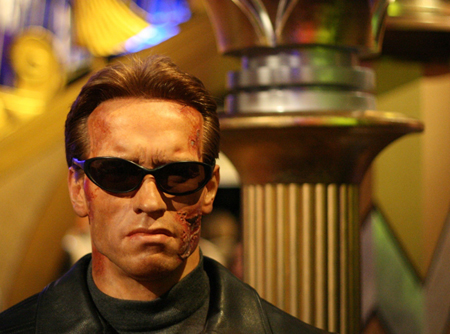The Bizarre Rise of Celebrity Politicians

"Life, liberty and the pursuit of happiness," is undoubtedly the most memorable quote in the American Declaration of Independence; one could argue that "happiness" (read: glamour and gizmos) is now a prerequisite to life and liberty. Renato Casaro's "Invitation" best depicts the way social trends and fads have replaced the importance of religion and politics in our lives. The famous painting, a parody of Leonardo Da Vinci's "Last Supper," shows Marilyn Monroe heading a table filled with Hollywood celebrities. Monroe is the messiah and Clark Gable is her Judas.
Everybody knows that stardom has taken over every inch of our culture. Your neighbour's daughter could become the next Hannah Montana. Maybe your grandmother will star alongside Betty White in a Golden Girls reunion.
Even politics is not immune; you might even say that politics is the new Hollywood. Some people get annoyed when actors launch a singing career, when singers become fashion designers and when designers become reality TV stars. But what happens when a celebrity heads to the "serious" world of politics?
Arnold "the Governator" Schwarzenegger managed to sweep people off their feet and was elected as governor of California in 2003. He won the recall elections with 48.6 percent of votes. Schwarzenegger's campaign, "Total Recall," was named after his 1990 box office hit. Certainly, the Governator had a few tricks up his sleeve, but his familiarity with the limelight couldn't have been detrimental to his political career.
Darrel M. West, a political scientist, wrote a short essay titled "Arnold Schwarzenegger and Celebrity Politics." He explains that, although the Governator a top-notch A-lister when running for office, his knowledge of policy was limited. But, interestingly enough, West claims that citizens are typically more willing to overlook a celebrity's past mistakes than a politician's old scandals.
The outbreak of celebrity publicity stunts in politics is something we should worry about. From Sarah Palin's TLC reality show to the dubious presidential candidacy of Donald Trump, people consume politics the same way they once consumed People Magazine.
Mathieu Deflem is a professor at the University of South Carolina, where he teaches a course that has gained a lot of media attention once introduced in 2009. "Lady Gaga and the Sociology of Fame" is offered in the sociology department and tackles the subject of stardom from a social standpoint, using "Mother Monster" as the lead example and pattern.
"The French philosopher Michel Foucault once said that politics is the continuation of war by other means. But in the US (and in other western democracies, I presume), politics has become a continuation of entertainment by other means, supported by and oriented at the media," wrote Deflem in an email. "Politicians do not lead. Nobody does anymore. Society is too complex today. There is a mere illusion of leadership. Charisma is nowadays a very easy quality to have as it also relates to the gullibility of others to accept someone as charismatic, even when they are not."
No one knows whether Donald Trump will run for president in the next American election or not. Is it a promotional stunt for The Apprentice or is it out of legitimate concern for the American population? Last thing I heard, he seemed pretty serious.
Truth is, no one knows what could happen if Trump runs and wins. Neither do we know if Sarah Palin's reality TV show could have earned her votes in case she lands the Republican presidential nomination in 2012.
Someday, maybe the US Cabinet will look just like Casaro's painting. In Canada, maybe, we'll look on in awe, perhaps wishing that Céline Dion or Brian Adams would step up to the plate and run for Prime Minister against Shania Twain.
Follow Mick on Twitter
Related on maisonneuve.org:
—Interview with Les Horswill
—Why I Don't Care what Sarah Palin is Reading
—John Stewart for President
Subscribe — Follow Maisy on Twitter — Like Maisy on Facebook





